Data science, bioinformatics

CHAVIT TUNVIRACHAISAKUL
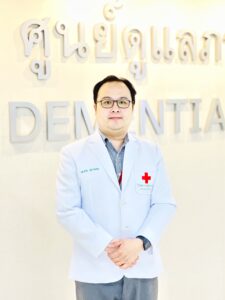
Lecturer
Department of Psychiatry Faculty of Medicine, Chulalongkorn University
Research interest :
- geriatric psychiatry
- informatic and precision medicine
- brain stimulation
- depression
- cognitive impairment
I help running the Dementia Day Center and Dementia Clinic of King Chulalongkorn Memorial Hospital. I also be a part of clinical instructor team of geriatric psychiatry training program. My current research and development projects are about patients with dementia, patients with depression that have other medical conditions, adapting current wearable technology to help older patients (e.g. smart watch and VR), and evaluating the use of repetitive Transcranial Magnetic Stimulation in patients with depression.

CHAIPAT CHUNHARAS
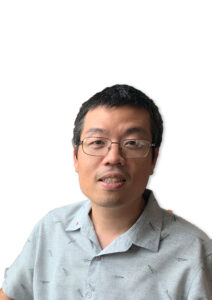
Lecturer
Chulalongkorn Cognitive, Computational & Clinical Neuroscience
Research interest :
- Cognitive Neuroscience
- Experimental Psychology
- AI
- Neurology
CC received his subspecialty trainings in Neurology and Internal Medicine and did his PhD in experimental psychology (Cognitive Behavioral Neuroscience subfield) at UCSD. His current researches focuses on bridging the gap between basic and clinical neuroscience.

SIPAT TRIUKOSE
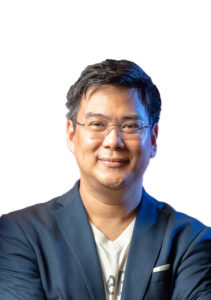
Lecturer
Chulalongkorn University Big Data Analytics and IoT Center (CUBIC)
Research interest :
- Application of Data Science and Digital Technology in Healthcare (e.g. CVD, DM, CKD, Retina, Skin, Lung, COVID-19)
- Large-Scale Performance Evaluation
- Telemedicine
Dr. Sipat Triukose is a member of Chulalongkorn University Big Data Analytics and IoT Center (CUBIC) and a research group on Applied Digital Technology for Medicine (ATM). He is also a member of the Thai Red Cross education and research committee. Early in the career, his areas of interest revolve around performance measurement and evaluation of a large-scale system, such as the Internet and web, content distribution network, computer network, and social network. He later expanded his interest toward big data analytics, digital transformation, and artificial intelligence applications in several fields of study, especially in medical research and the healthcare system. In 2018, he co-founded TrueEye.AI, a medical technology startup focusing on utilizing medical research and deep technology to create a preventive and non-invasive medical solution. Dr. Sipat Triukose received a Ph.D. in Computer Science from Case Western Reserve University (USA). Before joining Chulalongkorn University, he worked for National ICT Australia or NICTA (transformed to Data61 in 2016) in Sydney, Australia.

SIRA SRISWASDI

Lecturer
Research Affairs, Head of Computational Molecular Biology Group, Director of Center for Artificial Intelligence in Medicine
Research interest :
- Computational biology,
- Proteomics, Biological networks
- Machine learning
Dr. Sriswasdi studied theoretical mathematics, computer sciences, and computational biology at Massachusetts Institute of Technology and University of Pennsylvania with focuses on mass spectrometry-based proteomics of red blood cells and protein-protein interaction networks in C. elegans. He also did a postdoctoral research on molecular evolution of hybrid fungal genomes at the University of Tokyo. His current research applies bioinformatics and machine learning techniques to answer molecular biology and medical questions – from developing deep learning models for de novo peptide sequencing and diagnosing diseases in chest x-rays to decoding cell developmental pathway from single-cell transcriptomics data.

SIRIN NITINAWARAT
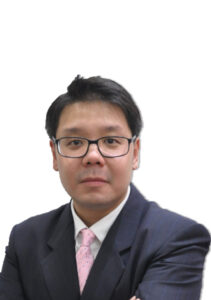
Lecturer
Faculty of Engineering, Chulalongkorn University
Research interest :
- Bio & Genetic engineering
- Data science
- Digital transformations Preventive medicine
- Public health
- Health & wellness
- Telemedicine.
Dr. Sirin Nitinawarat obtained the B.S.E.E. degree from Chulalongkorn University, Bangkok, Thailand, with first class honors, and the M.S.E.E. degree from the University of Wisconsin, Madison, USA. He received his Ph.D. degree from the Department of Electrical and Computer Engineering and the Institute for Systems Research at the University of Maryland, College Park, USA. He was a postdoctoral research associate at the Coordinated Science Laboratory at the University of Illinois at Urbana-Champaign, USA. He then had a career in the industry working as a senior systems engineer at Qualcomm Technologies, San Diego, California, USA, where he helped invented network technologies for cutting-edge smartphones for three years. After which he returned to Thailand as a lecturer at the International School of Engineering, Faculty of Engineering, Chulalongkorn University. His research interests are in bio and genetic engineering, data science, digital transformations, preventive medicine, public health, health and wellness, and telemedicine.

SOMPONG VONGPUNSAWAD

Lecturer
Faculty of Medicine, Chulalongkorn University
Research interest :
- Virology, Molecular Biology
- Microbiology
- Epidemiology
- Medical Genetics
Sompong Vongpunsawad, Ph.D., studies viruses that cause respiratory and enteric diseases in adults and young children. These viruses are often transmitted rapidly and cause wide-ranging symptoms. Vaccination against measles, influenza, and rotavirus have greatly reduced these diseases, but infections by enteroviruses, respiratory syncytial virus, and norovirus remain of concern. The lab’s expertise focuses on the rapid detection of virus infection in patients, surveillance of disease outbreaks in the community, and identification of novel viral variants of clinical importance. Accurate and timely diagnosis of viral infection using molecular/immunological assays will significantly improve patient care and help develop better vaccines and therapies.

PIRIYA WONGKONGKATHEP
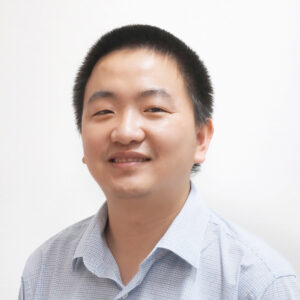
Lecturer
Faculty of Medicine, Chulalongkorn University
Research interest :
- Personalized Medicine
- Cancer Bioinformatics
- Proteomics
Dr. Piriya Wongkongkathep specializes in cancer multi-omics and personalized medicine. His research interests include cancer neoantigen discovery using multi-omics approaches, such as whole exome sequencing, RNA sequencing, and mass spectrometry-based proteomics to design the personalized treatment for cancer patients. Currently he is responsible for the first cancer neoantigen vaccine phase I clinical trial in Thailand at King Chulalongkorn Memorial Hospital. The aim is to stimulate mutation-specific immune responses to target cancer.

POOMJAI NACASKUL
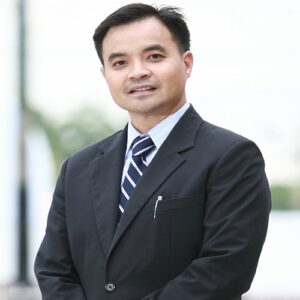
Lecturer
Scii – Chulalongkorn School of Integrated Innovation
Research interest :
- Machine Learning
- Artificial Neural Networks
- Evolutionary Optimisation Algorithms
- Financial Risk Management
- Sufficiency Economy Philosophy
BA in Physics & Economics double majors, MA in Operations Research, minor in Finance, from Case Western Reserve University, and Ph.D. in Computational Intelligence from Imperial College, University of London, with doctoral thesis on “Evolutionary Optimisation and Financial Model-Trading” 14+ years with the Bank of Thailand, final position Principal Researcher, Monitary Policy Group. 6+ years with Siam Commercial Bank, final position First Senior Vice President, Principal Data Scientist. Currently engaged in Data Science Consultancy projects with, amongst others, UOB Asset Management (Thailand), and on full-faculty contract with Chulalongkorn School of Integrated Innovation, Applied Digital Intelligence section.

PRAVEE KRUACHOTTIKUL

Lecturer
Chulalongkorn University Technology Center
Research interest :
- innovation
- innovation process development
- Applied digital and deep-tech research (i.e. AI, Data Science, Robotics, Automation, or IoT) for business applications such as health, medical, manufacturing, construction, etc.
Pravee Kruachottikul graduated in Ph.D. in the Technopreneurship and Innovation Management Programme, Graduate School, from Chulalongkorn University. His professional is a system integrator and innovation developer. He has an extensive background and work experience of more than 15 years in management within tech firms and deep-tech innovation incubator. His areas of research interests include innovation development and applied digital and deep-tech research (i.e. AI, Data Science, Robotics, Automation, or IoT) for business applications such as health, medical, manufacturing, construction, etc.

RONPICHAI CHOKESUWATTANASKUL
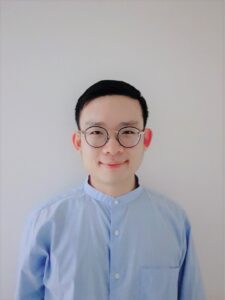
Lecturer
Clinical Lecturer Chulalongkorn University
Research interest :
- Cardiology: AI (and telemedicine)
- meta-analysis, survival analysis
- cohort study design.
Dr. Ronpichai Chokesuwattanaskul is a cardiac electrophysiologist, arrhythmia doctor, who is eager in the concept of collaboration and team players philosophy to generate innovation for community. HIs primary interest area is general cardiology, EKG, invasive procedures, AI, data science, bioinformatics, and data management. Other than clinical interest and teaching experiences, his works have been published in prestige journals, on average 10 publications per year in the past few years in addition to an extensive collaboration with faculties outside hospital including ivy league universities. He also plays role as academic editor of PLOS ONE journal.

TALENT THEPAREE
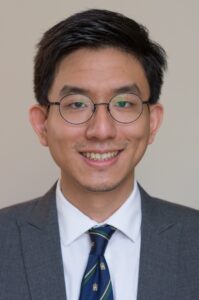
Lecturer
Faculty of Medicine, Chulalongkorn University
Research interest :
- Molecular pathology
- surgical pathology
- quality assurance
I am a board-certified surgical and molecular pathologist with a dream of making genomic testing more widely available in Thailand for diagnostic, prognostic, and therapeutic purposes. I did my training in the US (Chicago and the San Francisco Bay Area) and have previously done both quality improvement projects and new test validation for labs. I believe that creating usable infrastructure and good systems is a foundation of medical care.

PAKANAT DECHARATANACHART
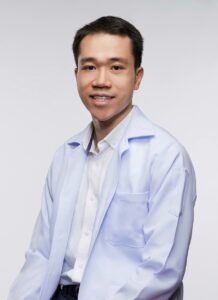
Lecturer
Chulalongkorn University International Medical Program (CU-MEDi)
Research interest :
- Cost-effectiveness analysis
- Meta-analysis
- Disease modeling
- Internal medicine
Dr. Pakanat graduated Doctor of Medicine and Board of Internal Medicine from Faculty of Medicine, Chulalongkorn University. He has always been interested in research with experience abroad at Harvard Stem Cell Institute and Center of Regenerative Medicine, Massachusetts General Hospital, Harvard University. His research interests are cost-effectiveness analysis, disease modeling and meta-analysis. He is currently working with the Department of Medicine to establish a cost-effectiveness research community at the Faculty of Medicine.

